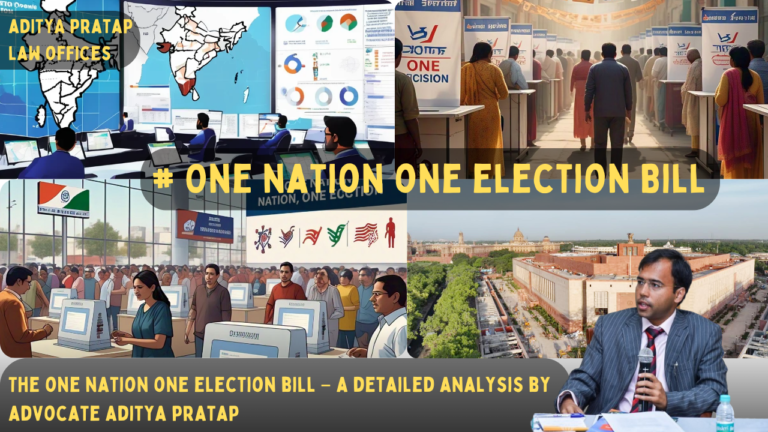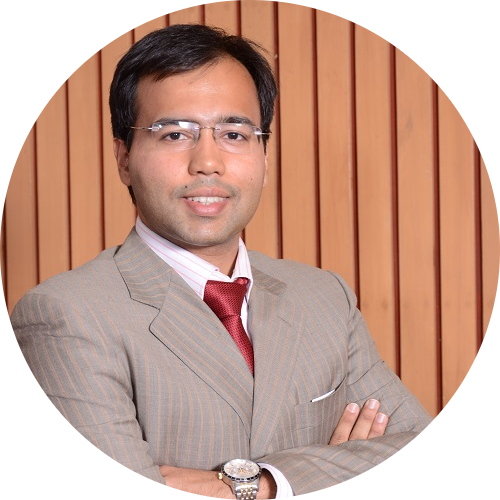
The One Nation One Election Bill was introduced in the Lok Sabha on 17 December 2024. The Bill (Short Form ONOE Bill) proposes the synchronization of elections for the Lok Sabha and all state legislative assemblies, aiming to conduct them simultaneously across the country.
The ONOE Bill proposes to amend Articles 83 and 172 of the Constitution of India. It also proposes to insert a new Article 82A which lays down the manner and process for conducting simultaneous elections across the country.
Salient Features of the ONOE Bill:
The ONOE Bill contains a total of five Sections. These comprise:
Section 1- Short Title and Commencement
Section 2 – Insertion of New Article 82A
Section 3 – Simultaneous Elections to the House of the People and all Legislative Assemblies
Section 4 – Amendment of Article 172
Section 5 – Amendment of Article 327
Section-Wise Analysis:
Let us now begin analysing the contents of each section of the ONOE Bill.
Section 1 states that the bill shall be known as the Constitution (One Hundred and Twenty-Nineth Amendment) Act, 2024. It shall come into force on such date as the Central Government may notify in the Official Gazette (Gazette of India – Extraordinary).
Section 2 proposes to insert a new Article 82A after Article 82 of the Constitution of India. The gist and highlights of the proposed draft of Article 82A are given below:
- The President of India can issue a public notification on the date of the first sitting of the Lok Sabha. This will be held immediately after the results of the general election. The date on which the notification is issued will be called the “Appointed date”.
- A Non-Obstante provision is inserted which overrides Articles 83 and 172 of the Constitution of India. Article 82(A)(2) provides that the term of the legislative assemblies of all states held after the ‘appointed date’ shall come to and end when the term of the Lok Sabha expires. This will apply to all legislative assemblies which are ‘constituted in any general election held after the appointed date’.
- Article 82A(3) contains another non-obstante provision by which the Election Commission can conduct general elections to the Lok Sabha and all state legislative assembles simultaneously before the expiry of the Lok Sabha. This non-obstante provision would override anything to the contrary contained in the provision.
- Article 82A(4) explains ‘simultaneous elections’ as being general elections held for constituting the Lok Sabha (House of the People) and all state legislative assemblies together.
- Article 82A(5) provides that if in exceptional circumstances, the Election Commission believes that elections to a particular state legislative assembly cannot be conducted simultaneously with that of the Lok Sabha, then it may recommend the President of India issue orders postponing the same to a later date.
- Article 82A(6) further states that if the elections to any particular state legislative assembly are deferred, its term shall nonetheless end on the same date as the Lok Sabha. This is also a non-obstante provision overriding anything to the contrary that may be contained in the Constitution.
- Article 82A(7) empowers the Election Commission of India to declare the date on which the full term of the state legislative assembly shall come to an end. This particular ending date can be stated in the notification announcing the election for any state legislative assembly. Thus, the voters will know the fixed date on which the term of that particular state legislative assembly will come to an end.
Gist of Proposed Amendments to Articles 83 and 172 of the Constitution of India:
Sections 3 and 4 of the ONOE Bill propose to amend Articles 83 and 172 of the Constitution of India respectively. The brief gist of each follows hereafter.
The proposed Article 83(3) provides that the five-year term of the Lok Sabha shall commence from the date of its first meeting after each general election. Thus the ‘full term’ is defined as the period of time beginning on the date of the first meeting of the Lok Sabha and ending five years thereafter.
The proposed Article 83(4) provides that if the Lok Sabha is dissolved before the expiry of its full term, the period between the date of its dissolution and the end of the ‘full term’ shall be referred to as its ‘unexpired term’.
The proposed Article 83(5) contains a non-obstante stipulation. It states that where the Lok Sabha is dissolved prior to the expiry of its full term, the new Lok Sabha election pursuant to elections shall not continue for five years. Instead, it shall only continue for the remainder of the ‘unexpired term’. Article 83(7) labels this as a ‘mid-term election’.
This means that after every five years in India, simultaneous general and state elections are guaranteed under the ONOE Bill. If the Lok Sabha is dissolved prior to the full term, the subsequent Lok Sabha elected under ‘mid-term’ elections will only operate for the remainder of the ‘unexpired term’. Article 83(6) specifically states that such a subsequent Lok Sabha shall not be a continuation of the previous house.
Section 4 of the ONOE Bill contains analogous provisions for the state legislative assemblies also. These are contained in the proposed Article 172(1A) to Article 172(5) which are proposed to be inserted by way of the ONOE Bill. This ensures that the tenure of all state legislative assemblies will be co-extensive with the full term of the Lok Sabha. This once the Lok Sabha completes five years, its tenure as well as that of the state legislatures will terminate. Further any legislative assembly prematurely dissolved and elected after a ‘mid-term election’ will only operate for the remainder of the ‘unexpired term’ of five years.
Reflecting upon the Provisions and Objectives of the ONOE Bill:
A plain reading of the contents of the ONOE Bill reveals the intention of the Government of India to streamline the election process in the country. According to the Statement of Objects and Reasons accompanying the ONOE Bill, the reasons for introducing the bill are as below:
- Reducing Costs and Burdens: Holding simultaneous elections would lead to significant savings in terms of financial resources, manpower, and administrative efforts that are often required for conducting multiple elections.
- Enhancing Governance: Simultaneous elections are expected to provide a more stable political environment, allowing governments to focus on long-term governance rather than frequent electioneering.
- Avoiding Electoral Fatigue: Frequent elections, both at the national and state levels, can cause voter fatigue and lower voter turnout. By synchronizing elections, this concern could be mitigated.
- Boosting Voter Participation: A common election date could potentially lead to higher voter turnout, as it would consolidate the efforts of both the government and political parties in mobilizing voters.
- Constitutional and Legal Reforms: The Bill likely discusses necessary constitutional amendments, including changes to the terms of elected representatives, to enable the synchronization of elections.
Likelihood of the Bill becoming Law – Will it Pass?
According to Article 368 of the Constitution of India, a two-thirds majority of the members present and voting is required for a bill amending the constitution to become law. The two-thirds majority requirement is applicable to both houses, the Lok Sabha and the Rajya Sabha.
This means that the One Nation One Election Bill will require two-thirds majority both, in the Lok Sabha (where it is currently pending) and the Rajya Sabha. This is likely to prove a difficult journey for the ruling BJP-led government due to the drastic drop in its tally of numbers in the 2024 general elections.
The One Nation One Election Bill thus represents a landmark amendment to the Constitution of India. Its passage is likely to benefit India democracy and boost its efficiency. It will ensure that the Central and State Governments are not perpetually on ‘poll mode’, thereby intensifying their focus on substantive governance and public service.

About the Author
Aditya Pratap is a practicing lawyer and founder of Aditya Pratap Law Offices based in Mumbai. An alumnus of NALSAR University of Law, Hyderabad, he has over 11 years of experience and has handled numerous cases of public and private significance. For more insights, you can visit his website: adityapratp.in. Watch him in TV interviews.